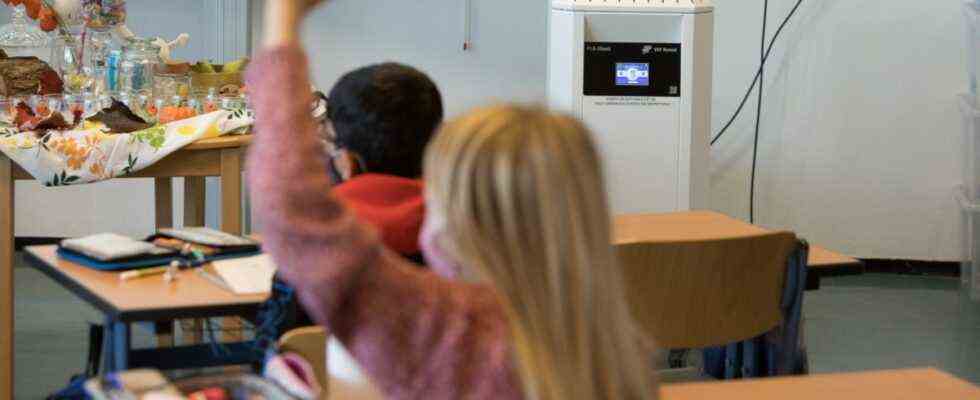The pressure is immense. Only nine more days, then the schools will calm down. The town halls and the district office will then also switch to holiday operations. And until then, parents would like to know how things should go in the schools in autumn. After the state government announced at the end of June, many are counting on the municipalities to purchase air purification devices so that regulated lessons are possible despite Corona. In some places there is still an oath these days. How tough an agreement can be can be seen in hair, for example. The community treasury is empty, but no one in the community council can be said to weigh money against health. In the district committee there was even a lot going on on Monday.
The shock wave that Prime Minister Markus Söder (CSU) triggered with his announcement continues to have an effect. In the district committee in Unterschleißheim, the Greens and the SPD were outraged on Monday that the state government had left them out in the rain. Christoph Nadler (Greens) said: “The decision of the state government is populist. If you have ordered that, then you should pay for it.” You should purchase the equipment and claim the costs from the Free State using the principle of connectivity.
The parents behind you
Haars Mayor Andreas Bukowski (CSU) recently found quieter but equally clear words in the building committee of the municipal council. What Söder is announcing is not feasible in the short time available. The schools are “the parents in the neck,” he said. It is no different with decision-makers in many town halls. So far, Haar has only bought a few devices, for which grants were received in the first funding program because the classrooms can only be ventilated poorly or not. Now the technology should be used everywhere.
Kathrin Tauber is chairwoman of the parents’ council at the Neubiberg primary school. You might be satisfied. Because air purification devices were installed at both primary schools in their community at the end of 2020. The aerosol researcher Christian Kähler from the Bundeswehr University in Neubiberg was the godfather. Tauber says that schools have had good experiences. There were no infections there; in two cases, students brought the virus with them; that was quickly contained. Nevertheless, she experiences great tension among the parents. Because despite room air purifiers, the children would not have had one day more face-to-face classes. Appeals to the Ministry of Culture would have brought nothing. Depending on the incidence, the school was strictly subjected to the regulations of all other schools. They are “significantly” bothered by the fact that such short-term and rigid action is being taken in the pandemic, says Tauber. “We need a plan.”
Mayors like Andreas Bukowski, who have only a few devices in the schools, are desperately looking for it. In Haar there is currently a discussion behind the scenes about cuts in club subsidies due to tax shortfalls. Now, impromptu 1.5 million euros are to be raised for 480 room air filters. 330,000 euros per year would be expected in follow-up costs. CSU parliamentary group leader Dietrich Keymer warned his colleagues. As before, that every wish is fulfilled, “it no longer works in this community, in this country no longer”. How he would vote, Keymer left open.
There is intense discussion everywhere. The mayor of Unterschleißheim, Christoph Böck (SPD), has recently shown a willingness to spend a lot of money. But he sharply criticizes the state government for the insufficient 50 percent funding. For weeks he has been warning that a lot of advance notice is necessary. By the end of October, the large number of class and daycare rooms will give you a rough overview of the costs and see what is feasible, said Böck recently. You will be able to apply for grants by the end of the year. The district committee agreed on Monday to issue a new test order to find out how effective room air filters are. District Administrator Christoph Göbel (CSU) said that at the beginning of the school year there would be no additional devices at the secondary schools for which the district is responsible. Time is too short for that.
“Have you ordered yet?”
“Have you ordered yet?” Höhenkirchen-Siegertsbrunn’s mayor Mindy Konwitschny (SPD) hears such questions from parents. In the process, she says, the state government clarified only last week which technical requirements the devices to be ordered would have to have. She is aiming for a decision in principle on July 29th and expects intensive discussions in the municipal council, but also with approval. Initially, only part of the equipment needed will be purchased in order to get below the critical sum for a Europe-wide, lengthy tender.
Headmaster Torsten Bergmühl at the Erich Kästner School in Höhenkirchen-Siegertsbrunn doesn’t want to paint in black. He sees that the church is doing what it can. The municipality has already purchased some devices for test purposes. But the parents’ expectation is of course that devices will be purchased for all rooms. The Rector is convinced that the debate will come back in autumn. Bergmühl already has the fourth wave of corona infections in mind, and he expects “that we will fight on well-known fronts again in autumn”.
Some fear that the health protection of children will depend on the financial situation of the municipalities. Hans Hofmann is chairman of the parents’ council at the grammar school in Garching, which is relatively new and has a permanently installed ventilation system. He is still waiting for a written confirmation that the system meets the criteria that effective virus protection requires. Hofmann, like his colleague Tauber in Neubiberg, still misses a plan by the state government. Corona protection according to the cash situation, he says, is “totally unsocial”.

